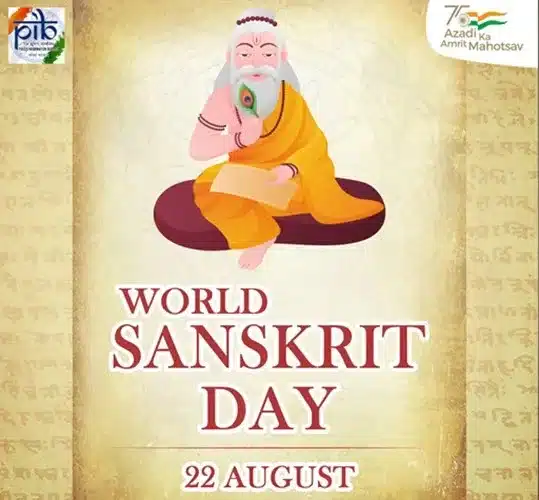Sanskrit and its usefulness to humanity

Sanskrit Diwas: The day is marked to promote Sanskrit, one of the oldest languages | PIB India
Today (22 August), on the Shravana Poornima – Full moon Day of Shravana month, is observed as World Sanskrit Day. As we started observing the certain days, it is perceived as the subject is lacking human attention and slowly losing its usefulness and need support, attention, or encourage a habit to bring back in life. So is the situation of Sanskrit in today’s world.
Sanskrit is believed to be an Indo-Aryan language, which is said to have originated around 3500 years ago. However, in the scriptures, the Sanskrit language is thought to have originated in the second millennium BCE, when the Rig Veda was composed. Despite its rich heritage, it lost its shine and its remarkable usefulness. Still, it is widely taught today at the secondary school level and students often opt for this language to score high marks in exams in comparison to alternative languages. However, despite attempts at revival, there are no first-language speakers of Sanskrit in India.
Now, the question comes — is Sanskrit not worthy of our thought? Is there a possibility the ancient language can serve mankind in any way? I observe based on my little to minuscule understanding and interaction with the language that Sanskrit is an extremely succinct language. It has an incredible ability to convey the message in the shortest possible way. Images below are few pages from Bhagavad Gita, and Shlokas are written first in Sanskrit and later translated into English. The translation was always occupying a bigger chunk of paper than the Shlokas itself. It could also be a possibility that If I could have retained my knowledge about Sanskrit from my Secondary school days, I could have conveyed in merely half of the space which I am taking now.
Sanskrit has been also found to be only one natural language that is found to be suitable for the transmission of ideas which artificial language can understand. It was well elaborated in the Paper “Knowledge Representation in Sanskrit and Artificial Intelligence” by Rick Briggs which was published in 1985. The paper observes that understandably, there is a widespread belief that natural languages are unsuitable for the transmission of many ideas that artificial languages can render with great precision and mathematical rigor. But this dichotomy, which has served as a premise underlying much work in the areas of linguistics and artificial intelligence, is a false one. There is at least one language, Sanskrit, which for the duration of almost 1000 years was a living spoken language with a considerable literature of its own.
Source: http://www.aistudy.co.kr/paper/aaai_journal/AIMag06-01-003.pdf
Like any idea and observation in the world, it attracts vehement supporters and criticism. For me, It would be difficult to conclude that Sanskrit is and would be the language of Computer enthusiasts and leave it to the judgment of time and experts. However, I would wish that the ancient Vedic language would serve mankind in one way or another in the time ahead.
Observer Voice is the one stop site for National, International news, Sports, Editor’s Choice, Art/culture contents, Quotes and much more. We also cover historical contents. Historical contents includes World History, Indian History, and what happened today. The website also covers Entertainment across the India and World.




